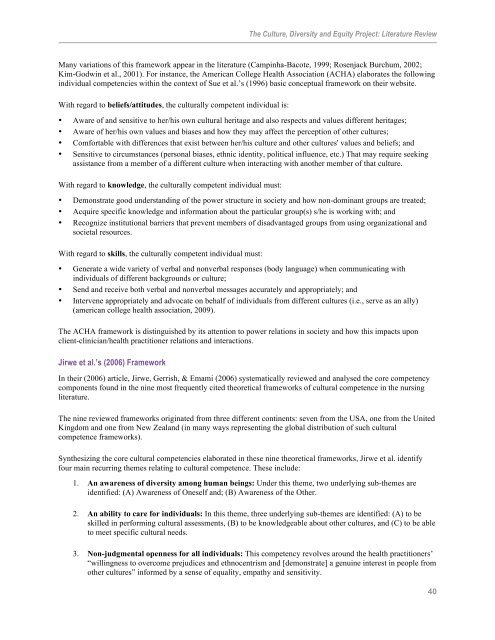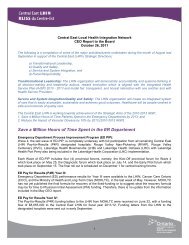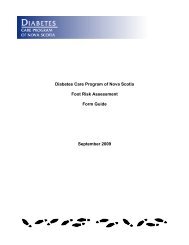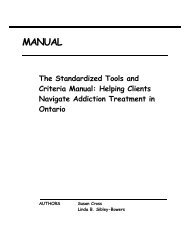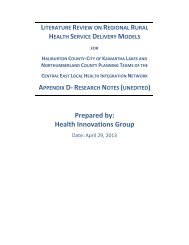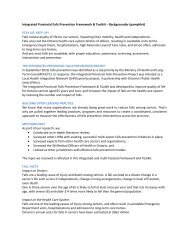CDE Appendix 1 Literature Review - Central East Local Health ...
CDE Appendix 1 Literature Review - Central East Local Health ...
CDE Appendix 1 Literature Review - Central East Local Health ...
Create successful ePaper yourself
Turn your PDF publications into a flip-book with our unique Google optimized e-Paper software.
The Culture, Diversity and Equity Project: <strong>Literature</strong> <strong>Review</strong><br />
Many variations of this framework appear in the literature (Campinha-Bacote, 1999; Rosenjack Burchum, 2002;<br />
Kim-Godwin et al., 2001). For instance, the American College <strong>Health</strong> Association (ACHA) elaborates the following<br />
individual competencies within the context of Sue et al.’s (1996) basic conceptual framework on their website.<br />
With regard to beliefs/attitudes, the culturally competent individual is:<br />
• Aware of and sensitive to her/his own cultural heritage and also respects and values different heritages;<br />
• Aware of her/his own values and biases and how they may affect the perception of other cultures;<br />
• Comfortable with differences that exist between her/his culture and other cultures' values and beliefs; and<br />
• Sensitive to circumstances (personal biases, ethnic identity, political influence, etc.) That may require seeking<br />
assistance from a member of a different culture when interacting with another member of that culture.<br />
With regard to knowledge, the culturally competent individual must:<br />
• Demonstrate good understanding of the power structure in society and how non-dominant groups are treated;<br />
• Acquire specific knowledge and information about the particular group(s) s/he is working with; and<br />
• Recognize institutional barriers that prevent members of disadvantaged groups from using organizational and<br />
societal resources.<br />
With regard to skills, the culturally competent individual must:<br />
• Generate a wide variety of verbal and nonverbal responses (body language) when communicating with<br />
individuals of different backgrounds or culture;<br />
• Send and receive both verbal and nonverbal messages accurately and appropriately; and<br />
• Intervene appropriately and advocate on behalf of individuals from different cultures (i.e., serve as an ally)<br />
(american college health association, 2009).<br />
The ACHA framework is distinguished by its attention to power relations in society and how this impacts upon<br />
client-clinician/health practitioner relations and interactions.<br />
Jirwe et al.’s (2006) Framework<br />
In their (2006) article, Jirwe, Gerrish, & Emami (2006) systematically reviewed and analysed the core competency<br />
components found in the nine most frequently cited theoretical frameworks of cultural competence in the nursing<br />
literature.<br />
The nine reviewed frameworks originated from three different continents: seven from the USA, one from the United<br />
Kingdom and one from New Zealand (in many ways representing the global distribution of such cultural<br />
competence frameworks).<br />
Synthesizing the core cultural competencies elaborated in these nine theoretical frameworks, Jirwe et al. identify<br />
four main recurring themes relating to cultural competence. These include:<br />
1. An awareness of diversity among human beings: Under this theme, two underlying sub-themes are<br />
identified: (A) Awareness of Oneself and; (B) Awareness of the Other.<br />
2. An ability to care for individuals: In this theme, three underlying sub-themes are identified: (A) to be<br />
skilled in performing cultural assessments, (B) to be knowledgeable about other cultures, and (C) to be able<br />
to meet specific cultural needs.<br />
3. Non-judgmental openness for all individuals: This competency revolves around the health practitioners’<br />
“willingness to overcome prejudices and ethnocentrism and [demonstrate] a genuine interest in people from<br />
other cultures” informed by a sense of equality, empathy and sensitivity.<br />
40


